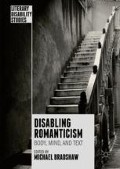Abstract
Chandler locates interest and importance in Robert Southey’s (largely unread and ridiculed) Laureate poetry by considering its responses to George III, mentally ill, blind, and virtually deaf. To discuss the King at all in the difficult situation of a Regency was audacious, and reflects Southey’s strong identification with the King rather than the Regent. The focus is on Southey’s A Vision of Judgement, in which the stricken George III acquires the status of a national myth. In this final statement as George III’s Laureate, Southey turns the King into a redemptive Christ-like figure whose blindness and ‘madness’ metonymically represent the blindness and madness of the whole generation, Southey included, who had been seduced by the promise of Wilkesite or French ‘liberty’. Chandler attempts to recuperate a sense, not just of the importance of Southey’s Laureate poetry, but of the role of George III and his illness in the public imagination.
Access this chapter
Tax calculation will be finalised at checkout
Purchases are for personal use only
Works Cited
Baker, K. (2007). George III: A life in caricature. London: Thames & Hudson.
Barasch, M. (2001). Blindness: The history of a mental image in western thought. New York: Routledge.
Broadus, E. K. (1921). The laureateship: A study of the office of poet laureate in England with some account of the poets. Oxford: Clarendon.
Burke, E. (1816). The speeches of the right honourable Edmund Burke (Vol. 4). London: Henry G. Bohn.
Byron, L. (1980–93). The complete poetical works. J. J. McGann (Ed.). 7 vols. Oxford: Clarendon Press.
Chandler, D. (2009). ‘In sickness, despair, and in agony’: Imagining the King’s illness, 1788–1789. In T. Connolly & S. Clark (Eds.), Liberating medicine, 1720–1835 (pp. 109–25). London: Pickering and Chatto.
Chandler, D. (2013). ‘The struggling ray’: The poets Laureate and George III’s illness, 1789–1810. Doshisha Studies in English, 90, 75–95.
Corston, W. (1840). A brief sketch of the life of Joseph Lancaster. London: Harvey.
Davies, P. M. (2007). Interview with Paul Driver, 17 July 2006. Mr Emmet Takes a Walk. CD. Psappha.
Elias, J. (2006). Funeral sermon of King George III. In Trans. O. Milton, Ed. J. R. Beeke, The experimental knowledge of Christ and additional sermons (pp. 73–93). Grand Rapids MI: Reformation Heritage Books.
Guttmacher, M. S. (1941). America’s last king: An interpretation of the madness of George III. New York: C. Scribner’s Sons.
Hamilton, W. (1879). The poets laureate of England. London: Franklin.
Hopkins, K. (1973). The poets laureate (3rd ed.). Wakefield: EP Publishing.
Jesse, J. H. (1867). Memoirs of the life and reign of King George the Third (Vol. 3). London: Tinsley Bros.
Kirby-Smith, H. T. (1996). The origins of free verse. Ann Arbor: University of Michigan Press.
Lockhart, J. G. (1837–38). Memoirs of the life of Sir Walter Scott, Bart (7 Vols). Edinburgh.
Macalpine, I., & Hunter, R. (1969). George III and the mad-business. London: Allen Lane.
Madden, L. (Ed.). (1972). Robert Southey: The critical heritage. London: Routledge.
Plumb, J. H. (1977). Royal heritage: The story of Britain’s royal builders. London: BBC.
Scott, W. (1827). The miscellaneous prose works (6 Vols). Edinburgh.
Simmons, J. (1945). Southey. London: Collins.
Southey, R. (1849–50). The life and correspondence of the late Robert Southey. C. C. Southey (Ed.) (6 Vols). London.
Southey, R. (2012). Poems from the Laureate Period, 1813–1823. In L. Pratt, D. E. White, I. Packer, T. Fulford, & C. Bolton (Eds.), Vol. 3 of Robert Southey: Later poetical works, 1811–1838 (4 Vols). London: Pickering and Chatto.
Thackeray, W. M. (1908). The Oxford Thackeray. G. Saintsbury (Ed.) (17 Vols). Oxford: Oxford University Press.
Wynne-Davies, M. (Ed.). (1990). The Prentice Hall guide to English literature. New York: Prentice Hall.
Author information
Authors and Affiliations
Editor information
Editors and Affiliations
Copyright information
© 2016 The Editor(s) (if applicable) and The Author(s)
About this chapter
Cite this chapter
Chandler, D. (2016). ‘In Mental as in Visual Darkness Lost’: Southey’s Songs for a Mad King. In: Bradshaw, M. (eds) Disabling Romanticism. Literary Disability Studies. Palgrave Macmillan, London. https://doi.org/10.1057/978-1-137-46064-6_5
Download citation
DOI: https://doi.org/10.1057/978-1-137-46064-6_5
Published:
Publisher Name: Palgrave Macmillan, London
Print ISBN: 978-1-137-46063-9
Online ISBN: 978-1-137-46064-6
eBook Packages: Literature, Cultural and Media StudiesLiterature, Cultural and Media Studies (R0)

